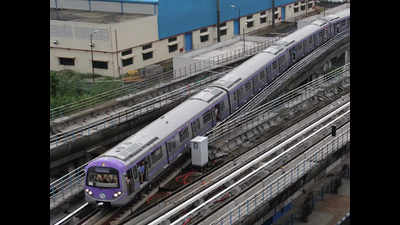- News
- City News
- kolkata News
- Commuter count dips, Kolkata Metro misses 50,000 mark
Trending
This story is from September 24, 2020
Commuter count dips, Kolkata Metro misses 50,000 mark
Although Metro Railway was expected to achieve 50,000 ridership on Wednesday, the ridership was nearly 1,000 fewer than the figure of 46,711 registered on Tuesday. Both were working days.

A Kolkata Metro train
KOLKATA: Although Metro Railway was expected to achieve 50,000 ridership on Wednesday, the ridership was nearly 1,000 fewer than the figure of 46,711 registered on Tuesday. Both were working days.
As many as, 127 riders had travelled on the elevated 5km Salt Lake stretch of East-West Metro on Tuesday, but only 72 took the train on Wednesday. Interestingly, the highest number of e-passes — 72,000 — were issued on Wednesday for the north-south section.On Tuesday, it was 70,000. When Metro resumed services on September 14, 53,000 passes had been booked, but the ridership was only 20,000.
On Wednesday, the ridership’s upward graph dipped for the first time on a working day, with 45,808 people taking the Metro. Booking e-passes in advance is compulsory for accessing the north-south stations, most of which are underground. The country’s oldest Metro line is also saddled with the highest per-kilometre passenger density.
The e-passes have turned out to be the most effective crowd-control tool. They ensure that only 400 board an eight-coach train at a time. The 8am-8pm timetable has been split into 12 slots for booking the e-passes.
This Monday, the e-pass boarding system was tweaked to accommodate more commuters and the cap for booking e-passes was increased by 30% for busy stations. False bookings have been jamming slots for stations like Dum Dum and Kalighat. Many generated the passes, filling up the 12 slots, but didn’t take the train. Since last Friday, more genuine travellers seemed to be generating passes than before.
As many as, 127 riders had travelled on the elevated 5km Salt Lake stretch of East-West Metro on Tuesday, but only 72 took the train on Wednesday. Interestingly, the highest number of e-passes — 72,000 — were issued on Wednesday for the north-south section.On Tuesday, it was 70,000. When Metro resumed services on September 14, 53,000 passes had been booked, but the ridership was only 20,000.
On Wednesday, the ridership’s upward graph dipped for the first time on a working day, with 45,808 people taking the Metro. Booking e-passes in advance is compulsory for accessing the north-south stations, most of which are underground. The country’s oldest Metro line is also saddled with the highest per-kilometre passenger density.
The e-passes have turned out to be the most effective crowd-control tool. They ensure that only 400 board an eight-coach train at a time. The 8am-8pm timetable has been split into 12 slots for booking the e-passes.
Over the past few days, the gap between the figures of booking and ridership had been steadily going down. But Wednesday turned out to be an exception. Sanjoy Chatterjee, whom the state government has appointed to develop the Pathadisha Metro e-pass, said he would study Wednesday’s algorithm to find out the cause. “The variation can be taken as a sign of normalcy. In West Bengal Transport Corporation (WBTC), ridership varies between 5%-7% on an average.” But then, this is the city’s lifeline one was talking about and ridership, till Tuesday, more than doubled since Metro re-started last Monday.
This Monday, the e-pass boarding system was tweaked to accommodate more commuters and the cap for booking e-passes was increased by 30% for busy stations. False bookings have been jamming slots for stations like Dum Dum and Kalighat. Many generated the passes, filling up the 12 slots, but didn’t take the train. Since last Friday, more genuine travellers seemed to be generating passes than before.
End of Article
FOLLOW US ON SOCIAL MEDIA










